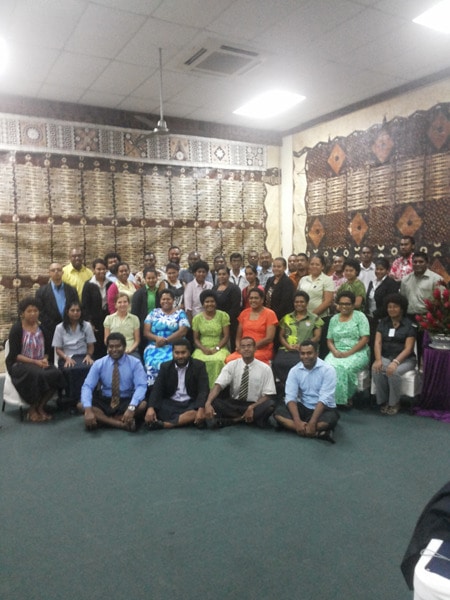The Department of Environment (DOE) in conjunction with Department of Town and Country Planning (DTCP) hosted 3 days of training and capacity building program for existing and potential Environment management unit (EMU) within respective agencies last week. Participants from government ministries, local authorities, statutory partners and non government organization such as the Fiji Environment Law Association (FELA) and Mamanuca Environment Society (MES) were part of the training.
The training mainly focused on:
- Roles and structure of the DOE and other agencies
- Roles of EMU
- The need to establish EMU
- Environmental Governance and Sustainable Development
- Facilitating to better practices in terms of Environmental Impact Assessment process and
- Climate Change
The training was officially opened by Mr Nasome a former Director of DOE. He emphasized on the importance of working together with our respective stakeholders in upholding the existing environment regulation. A presentation by the Assistant Director of Department of Environment, Mr Qareqare focused on the importance of environmental government and sustainable Development. He added that good governance is perhaps the single most important factor in eradicating poverty and promoting development. ‘Sustainable development is governed by three main pillars, social, environment and economy’ said Mr Qareqare.
Sectorial Presentations, case studies, interactive forum and group presentation were the different modes of delivery. Information sharing through brochures and leaf-lets comprising laws and policies, sustainable developments, legislations, approving authorities, Environment Impact Assessment( EIA), and human resource development programme were also distributed as part of training packages.
According to MES Project Manager, Marica Vakacola, attending the training was a great opportunity to build capacity on national regulation that governs the society roles and responsibilities in the region. The Fiji Environment Management Act (EMA-2005) plays an important role in addressing environment issues and development that our tourism stakeholders and communities are engaged in. She added that the training helped her better understand the roles of various approving processes of line ministries that addresses specific environment issues and development such as EIA and Construction Environment Management Plans (CEMP). The society will benefit a lot by improving network with government stakeholders and partners in implementing environment and resource management policies and better our environment management role in the region”. DOE hopes to establish more EMU with other government ministries after this training as mandated under Section 15(1) of the Environment Management Act (2005).


